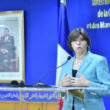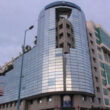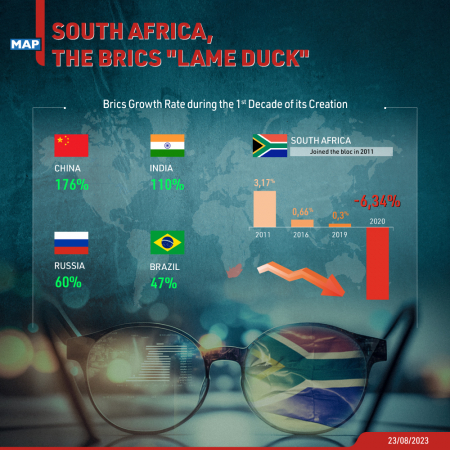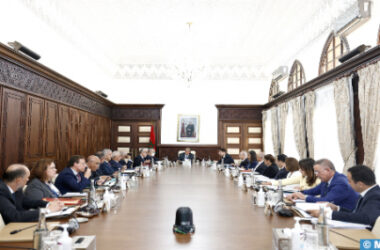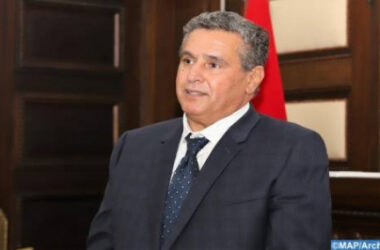The objective is lofty. The summit seeks to propel the club, set up in 2009, to playing a role of “flag bearer” of the global south and, hence, pave the way for a reform of the global financial and political governance architecture.
However, experts wonder about the viability and durability of the project. The ambition is bogged down, according to them, in the complexity of a disparate group and in the diverging objectives of its member countries some of whom suffer from huge economic deficits.
+ The South African Wrong Key +
South Africa is mentioned on top of the list. The country that joined the bloc in 2011, has always lagged behind in terms of economic performance compared to China, India, Russia and Brazil, which represent the backbone of a group designed to be the gathering of emerging countries.
The experts’ arguments are shored up by statistics. During the first decade since the inception of the BRICS, all four countries initially performed well. China’s economy grew by 176%, India’s by 110%, Russia’s by 60% and Brazil’s by 47%. The club saw its performance go downhill after the much smaller South Africa joined in 2011.
During that decade, South Africa’s economy went from bad to worse as a result of the disastrous policies of the African National Congress, at the helm of the country since 1994. A modest growth of 3,17% was the country’s best performance during that decade. The rate would continue to go down the slippery slope with 0,66% in 2016, 0,30% in 2019 before hitting the bottom of a humiliating -6,34% in 2020.
This year, China’s GDP will hit 19 trillion dollars, ie 50 times higher that South Africa’s. Worse, the country’s economy is just a quarter of that of Brazil, which ranks fourth among the BRICS countries.
Since 2014, South Africa saw its sovereign grade degraded by the major rating agencies, as a result of the state of collapse of a country crippled by years of corruption.
The figures are the perfect illustration of the “false key” that South Africa represents within the club. Pretoria’s inclusion in the group has been considered so since the beginning by Jim O’Neill, a former British chief economist at Goldman Sachs, who gained world fame for coining the acronym BRIC to combine the four large emerging economies (South Africa was not on his list).
In a note to investors, O’Neill said: “the presence of South Africa within the group is a handicap”. He believed that the country’s limited capacity to contribute to financing the bloc’s initiatives is “a brake” to the group’s development plans.
+ The Dream of mirage leadership+
The media frensy in which the South African leaders embarked on over the last weeks, tells about their stubbornness to defend a so-called “leadership” in Africa.
Lyal White, researcher at the South African Brenthurst Foundation, says that Pretoria is indeed over paced by other economic powerhouses in Africa. A situation which shows, according to the researcher, the “insignificant” economic role of South Africa in a bloc in which it was admitted “for geopolitical reasons”.
Folashadé Soulé, researcher at Oxford University, believes that South Africa has lost much of its economic clout in Africa. The country can no longer pretend to be “the spokesman” of Africa, he says, stressing South Africa’s economic failures.
+ an Outdated Dogmatic Posture+
The analyst also stresses that foreign investors are turning their back to South Africa, preferring more secure and more promising destinations on the continent.
South Africa’s presence in the BRICS “is only meant to serve the country’s foreign policy interests rather than those of Africa”, adds Soulé.
Several analysts agree, in this regard, that the dogmatic and ideological posture Pretoria adopts to serve lost causes is an additional brake to the BRICS’ capacity to attain its economic objectives. An attitude that indeed make South Africa “the lame duck” of the group.
Even though South African leaders claim that their Country’s presence in the BRICS is an opportunity to promote African interests, it actually allows Pretoria to attract international attention despite its modest economic weight, notes the researcher, citing “serious suspicions” in Africa with regard to the real aims of South Africa within the club.


